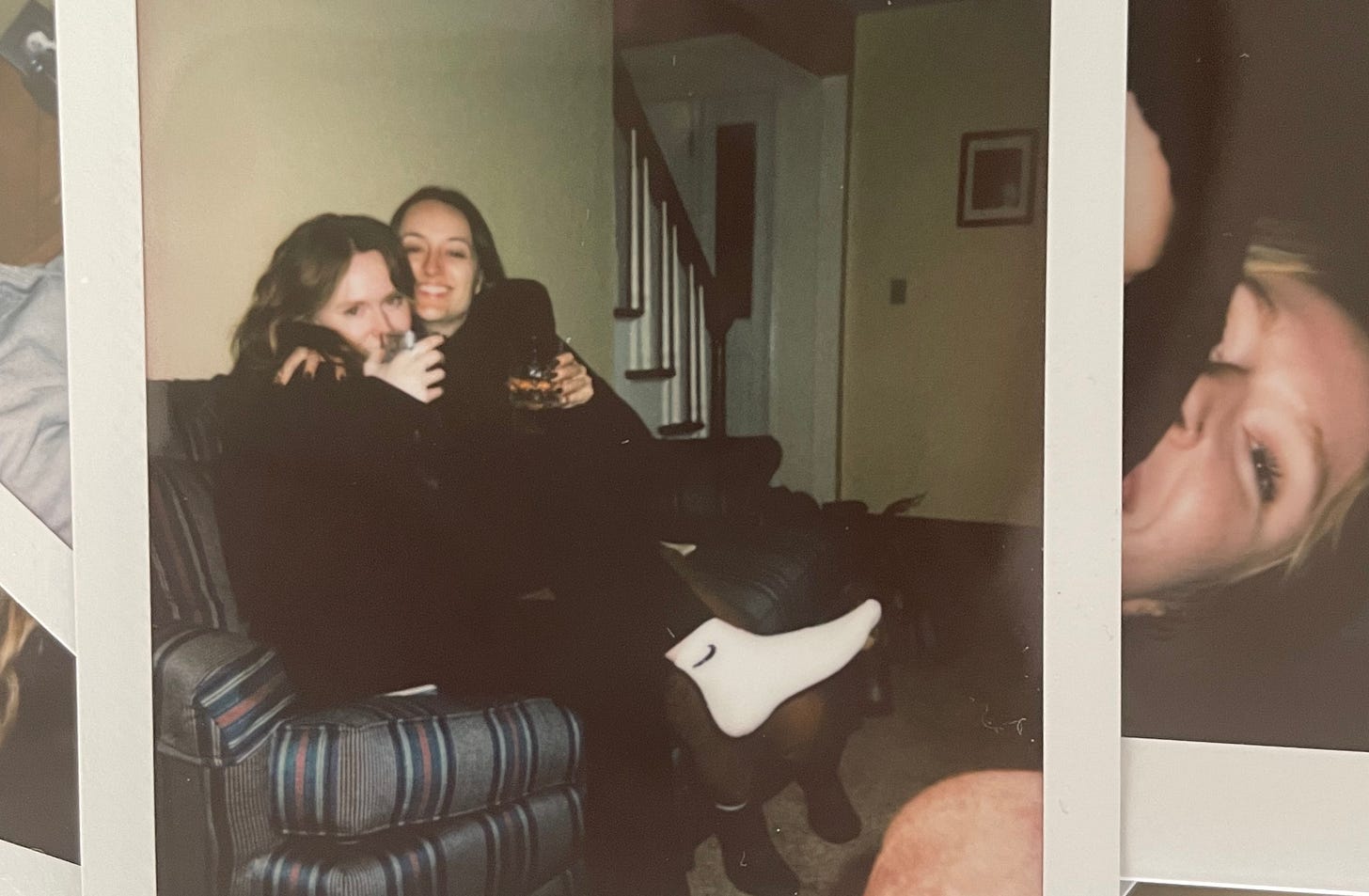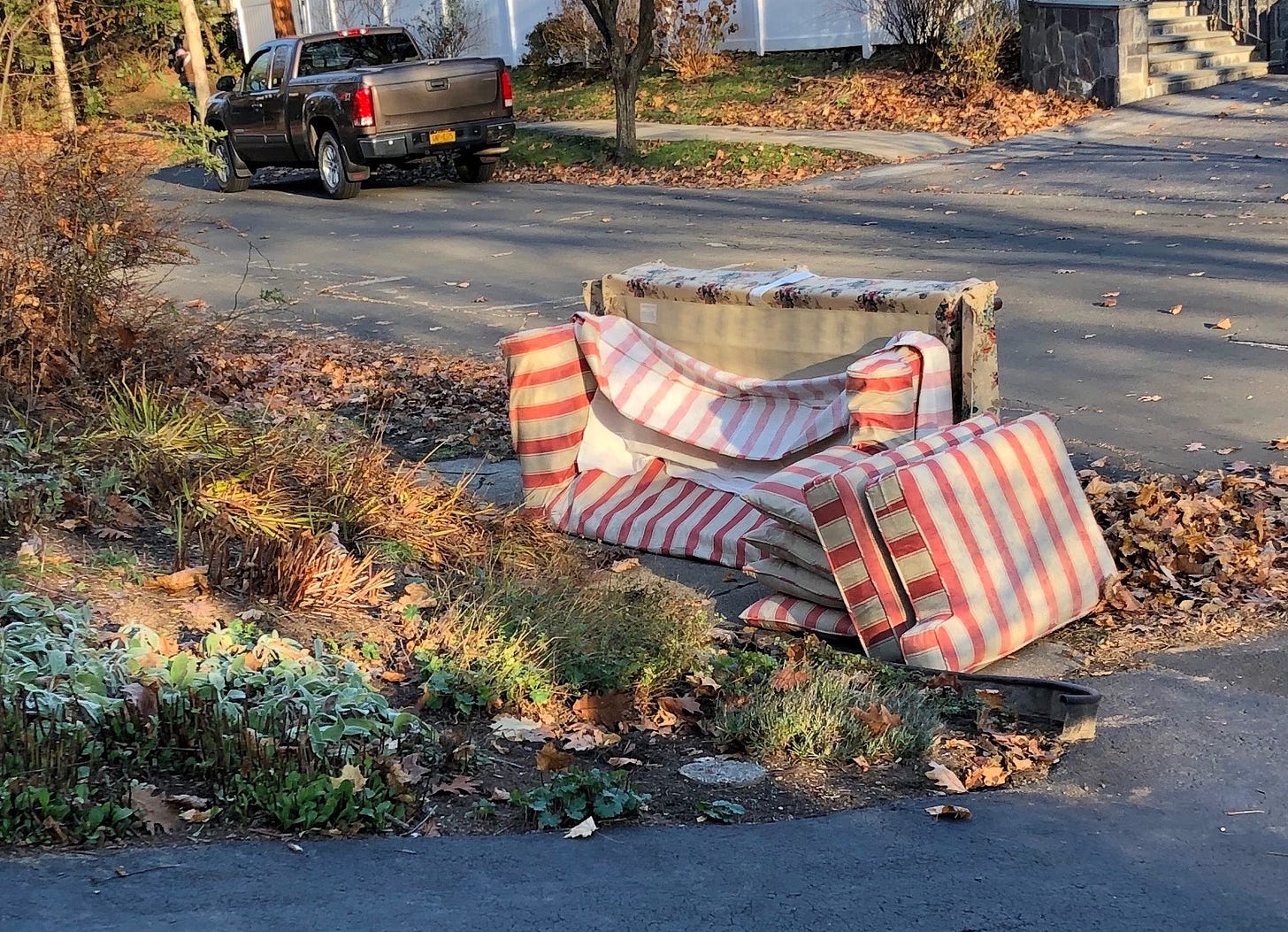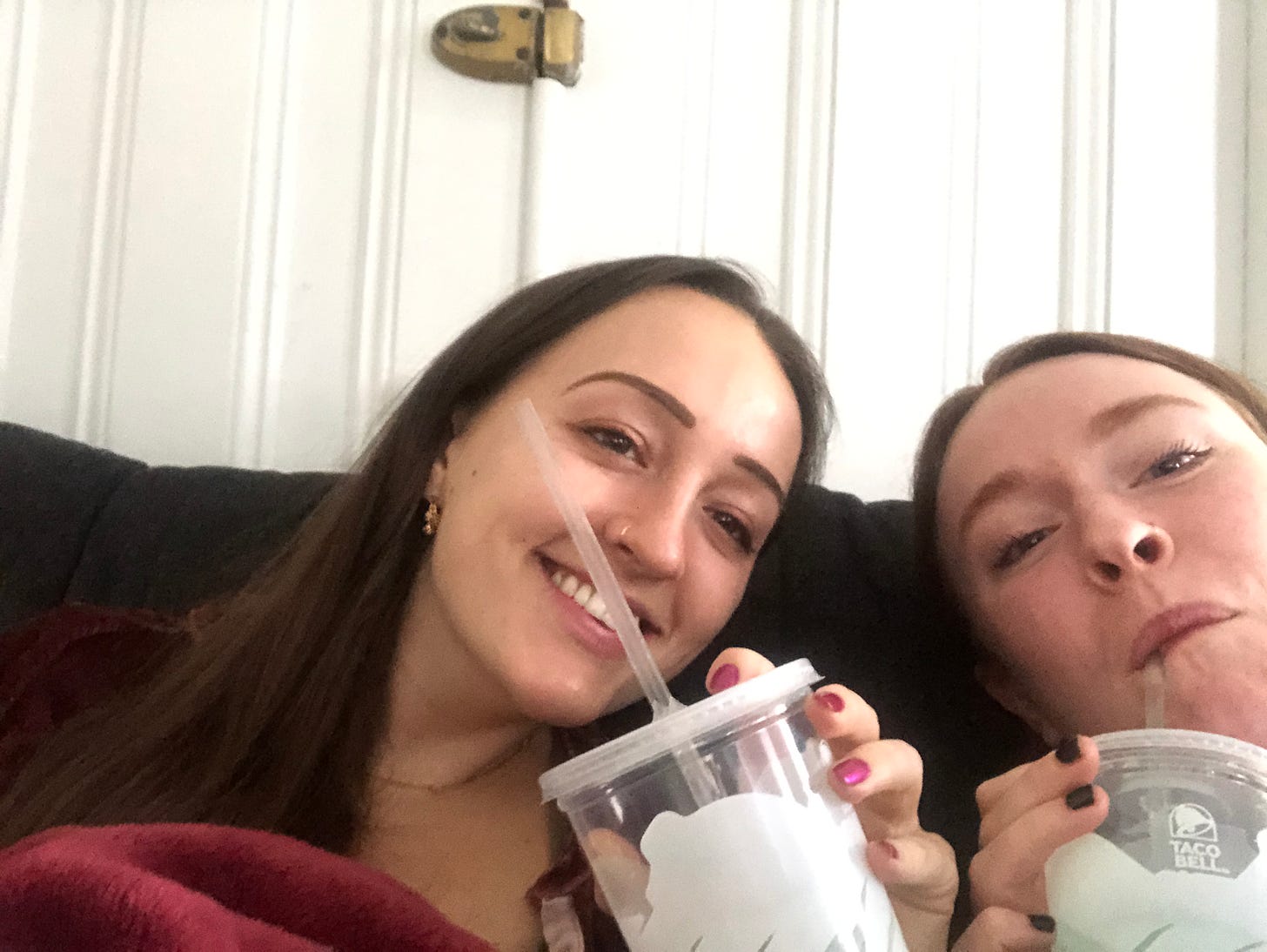From the ages of 19-25, I spent a lot of time on a couch. So much changed throughout those years: jobs, romantic partners, presidents, my bangs situation, groups of friends. The location of the couch changed. The type of couch changed, too.
There was the couch that was completely broken down the middle, forcing those who sat upon it towards its center like a hammock. There was the massive, overstuffed sectional that my friend got for free because its previous owner had just died. There was the big futon with a permanent trail of crumbs cemented down the crease where it folded to become an equally uncomfortable bed. There was the AmVets miracle couch that was gorgeous, upholstered in salmon-colored crushed velvet, with rolled arms and dark wood trim.
Although the appearances and placements of these couches varied, all of these couches served a very important function. They were the backgrounds for what I call Couch Friendships.
Couch friendships are hard to find, and they are equally hard to hold onto. Couch friendships are the kind of friendships that require zero plans, outfits, or conversational topics. You sit on a couch next to each other and talk about the same thing every day. You show up on each other's couches unannounced. You sit in silence for hours. You say objectively troubling things to your couch friends and they’re always like “whoa, yeah, he sounds crazy.” You cry suddenly and without warning and they hold you until you stop and then you keep watching 13 Going on 30. With couch friends, there’s no catching up period. You have dissected every moment in each other’s lives using every possible psychoanalytical theory but can always find new ways to discuss these same topics.
Your couch friends have seen the ugliest parts of you and you theirs. These friendships are built upon a love that is even more unconditional than familial love. At some point, you chose to be in each other’s lives, and every day since, you chose to walk back over to one another’s apartments and sit on that same couch.
Couch friends are community. Why, then, does it seem that so few of us have these comfy kinds of second-nature friendships into late adulthood?
One of the most profound losses I’ve experienced in my post-graduate, adult life was that of my couch friendships. Couch friendships are hard to maintain when people start careers, meet new partners, and move to new cities. Adulthood and couch friends are, it seems, incompatible. And that’s because adulthood is, unfortunately, synonymous with capitalist values. The individualism required to keep capitalism afloat makes support networks incredibly difficult to find—intentionally so.
incredibly dramatic pic of my parents’ recently discarded couch courtesy of my father
Adulthood means your couch friends are, at most, bi-monthly house guests. Adulthood means “finding ourselves” and venturing forward, away from the comfy, overstuffed confines of the friendships and couches of adolescence. In search of replacements for our couch friends, we find brief romantic flings, pets, jigsaw puzzles that look like breakfast buffets, various vices, or jobs that consume all of our free time.
Ann Helen Petersen writes beautifully about it all here—about how American values and white supremacy have created a culture in which we are encouraged (see: forced) to make it on our own and never ask for help, and how, consequentially, spaces of community and mutual aid organizations disappear over time. Once we leave our parents’ homes and our college communities and maybe (if we’re lucky) our first few apartments after college, reliance on community becomes a sign of weakness. A failure.
We move on, we start our nuclear families, and then we die alone in a home somewhere while our adult children fret over how to afford our end-of-life care. That’s the American dream, baby!
Capitalism teaches us that we are not required to care for one another. We are not expected to worry about the other adults in our lives, as couch friends do. Having a friend to call up when we want to cry and die because we’ve made yet another bad decision is a luxury. We don’t owe each other anything. One person’s misfortune is due to their own bad luck, or their inability to work hard enough or start a side hustle reselling clothes on Depop. Individualism, we are taught, proves our own strength and resilience.
This individualism, of course, is an illusion, and as everyone’s favorite goofball, Karl Marx, said: “In bourgeois society, capital is independent and has individuality, while the living person is dependent and has no individuality.” Our personhood is contingent on our jobs and our ability to produce, rather than our own self-actualization and our relationships with fellow human beings, and so we submit completely to our occupations. (I may be misinterpreting this completely but it was very brave of me to try, don’t you think?)
Deep and meaningful human connection is not required to keep the global economy afloat, but labor is, and so our friendships fall to the wayside as we sacrifice our sense of self, sanity, loved ones, and energy for our work.
Unfortunately, this illusion of individual success is vivid and widespread and always seems right within our grasp. So we let any existing structures of support (social security, welfare, universal healthcare, what have you) crumble, which leads to a general cultural consensus that those who need (or want!) the help of others are weak, inadequate moral failures.
If this isn’t resonating, I present you with this: Why are we so fucking mean to people who live at home with their parents?
Capitalism and colonialist ideals are so tied together and have made our brains so unbelievably squishy that we believe that living at home, surrounded by familiar faces that love us unconditionally is…bad?
We think of people who never “made it out” of their hometowns as worthy of pity. As lesser-than. Like, there are parents who make their own children pay rent for living at home after college. And yet here we (I) are (am), barely making rent in a 700-square-foot apartment, paying $500 to fly across the country to see my best friend for the first time in six months. I ate fucking Cheez-Its for dinner and just realized I haven’t spoken out loud all day. This is success, or so we’re told.
Comfortability and community are not accounted for as we grow older and forge “our own” paths. And that’s because the infrastructure required to maintain couch friends is nearly impossible to come by. Cities aren’t walkable. Large, multi-family homes are hacked apart into eighteen studio apartments. Marriage offers unique legal benefits that platonic friendships do not. Affording rent requires a paying job that requires relocating, working 60 hours a week, total mental exhaustion, or all of the above.
As we age, having couch friends is logistically inconvenient.
Couch friends are happiness and capitalism doesn’t care if we’re happy. It prefers that we aren’t. Because if we could all sit around on Laurel’s couch eating sour straws and doing our nails every day, we would simply never go to work again. So we distract ourselves and find joy in the little things, which is an important and necessary practice but never replicates the consistent feeling of support from a couch friend.
But what’s beautiful about couch friends is that you can never un-have a couch friend. The level of comfort required to become couch friends builds an inextricable bond. You meet them in your most formative years, you become people together, side-by-side, curled up in faux-suede comfort. The time you spend on that one couch or many couches prepares you for the time you’ll spend apart. You soak in every last second of familiarity and ease and understanding, never taking it for granted.
Couch friends establish a kind of deep trust and connection that makes it easy to pick back up where you started as soon as you reunite. Couch friends are like breathing. Couch friends are like a sitcom you watch over and over, still chuckling at the same jokes eight watches later. Couch friends are a FaceTime call away—calls that last for hours during which you barely talk. You just sit on your own couches, phones out, enjoying a tinier version of the days spent together side by side.
It kinda sucks. But it’s almost as good. And it’s so much better than never having had a couch friend at all.








thanks i'm crying now